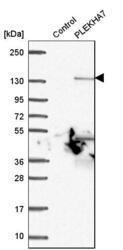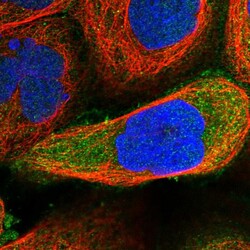Antibody data
- Antibody Data
- Antigen structure
- References [8]
- Comments [0]
- Validations
- Western blot [1]
- Immunocytochemistry [1]
Submit
Validation data
Reference
Comment
Report error
- Product number
- HPA038610 - Provider product page

- Provider
- Atlas Antibodies
- Proper citation
- Atlas Antibodies Cat#HPA038610, RRID:AB_10671746
- Product name
- Anti-PLEKHA7
- Antibody type
- Polyclonal
- Description
- Polyclonal Antibody against Human PLEKHA7, Gene description: pleckstrin homology domain containing, family A member 7, Alternative Gene Names: DKFZp686M22243, Validated applications: WB, IHC, ICC, Uniprot ID: Q6IQ23, Storage: Store at +4°C for short term storage. Long time storage is recommended at -20°C.
- Reactivity
- Human
- Host
- Rabbit
- Conjugate
- Unconjugated
- Isotype
- IgG
- Vial size
- 100 µl
- Concentration
- 0.2 mg/ml
- Storage
- Store at +4°C for short term storage. Long time storage is recommended at -20°C.
- Handling
- The antibody solution should be gently mixed before use.
Submitted references Actin-dependent recruitment of AGO2 to the zonula adherens
ECM Substrates Impact RNAi Localization at Adherens Junctions of Colon Epithelial Cells
PLEKHA7, an Apical Adherens Junction Protein, Suppresses Inflammatory Breast Cancer in the Context of High E-Cadherin and p120-Catenin Expression
Predominant Distribution of the RNAi Machinery at Apical Adherens Junctions in Colonic Epithelia Is Disrupted in Cancer
miR-24 Is Elevated in Ulcerative Colitis Patients and Regulates Intestinal Epithelial Barrier Function
Cadherin complexes recruit mRNAs and RISC to regulate epithelial cell signaling
PLEKHA7 defines an apical junctional complex with cytoskeletal associations and miRNA-mediated growth implications
Binding between the Junctional Proteins Afadin and PLEKHA7 and Implication in the Formation of Adherens Junction in Epithelial Cells
Bridges M, Nair-Menon J, Risner A, Jimenez D, Daulagala A, Kingsley C, Davis M, Kourtidis A, Yap A
Molecular Biology of the Cell 2023;34(13)
Molecular Biology of the Cell 2023;34(13)
ECM Substrates Impact RNAi Localization at Adherens Junctions of Colon Epithelial Cells
Daulagala A, Kourtidis A
Cells 2022;11(23):3740
Cells 2022;11(23):3740
PLEKHA7, an Apical Adherens Junction Protein, Suppresses Inflammatory Breast Cancer in the Context of High E-Cadherin and p120-Catenin Expression
Pence L, Kourtidis A, Feathers R, Haddad M, Sotiriou S, Decker P, Nassar A, Ocal I, Shah S, Anastasiadis P
International Journal of Molecular Sciences 2021;22(3):1275
International Journal of Molecular Sciences 2021;22(3):1275
Predominant Distribution of the RNAi Machinery at Apical Adherens Junctions in Colonic Epithelia Is Disrupted in Cancer
Nair-Menon J, Daulagala A, Connor D, Rutledge L, Penix T, Bridges M, Wellslager B, Spyropoulos D, Timmers C, Broome A, Kourtidis A
International Journal of Molecular Sciences 2020;21(7):2559
International Journal of Molecular Sciences 2020;21(7):2559
miR-24 Is Elevated in Ulcerative Colitis Patients and Regulates Intestinal Epithelial Barrier Function
Soroosh A, Rankin C, Polytarchou C, Lokhandwala Z, Patel A, Chang L, Pothoulakis C, Iliopoulos D, Padua D
The American Journal of Pathology 2019;189(9):1763-1774
The American Journal of Pathology 2019;189(9):1763-1774
Cadherin complexes recruit mRNAs and RISC to regulate epithelial cell signaling
Kourtidis A, Necela B, Lin W, Lu R, Feathers R, Asmann Y, Thompson E, Anastasiadis P
Journal of Cell Biology 2017;216(10):3073-3085
Journal of Cell Biology 2017;216(10):3073-3085
PLEKHA7 defines an apical junctional complex with cytoskeletal associations and miRNA-mediated growth implications
Kourtidis A, Anastasiadis P
Cell Cycle 2016;15(4):498-505
Cell Cycle 2016;15(4):498-505
Binding between the Junctional Proteins Afadin and PLEKHA7 and Implication in the Formation of Adherens Junction in Epithelial Cells
Kurita S, Yamada T, Rikitsu E, Ikeda W, Takai Y
Journal of Biological Chemistry 2013;288(41):29356-29368
Journal of Biological Chemistry 2013;288(41):29356-29368
No comments: Submit comment
Enhanced validation
- Submitted by
- Atlas Antibodies (provider)
- Enhanced method
- Recombinant expression validation
- Main image

- Experimental details
- Western blot analysis in control (vector only transfected HEK293T lysate) and PLEKHA7 over-expression lysate (Co-expressed with a C-terminal myc-DDK tag (~3.1 kDa) in mammalian HEK293T cells, LY406299).
- Sample type
- Human
- Protocol
- Protocol
Supportive validation
- Submitted by
- Atlas Antibodies (provider)
- Main image

- Experimental details
- Immunofluorescent staining of human cell line A-431 shows localization to nucleus, cytosol & cell junctions.
- Sample type
- Human
 Explore
Explore Validate
Validate Learn
Learn Western blot
Western blot Immunocytochemistry
Immunocytochemistry Immunohistochemistry
Immunohistochemistry